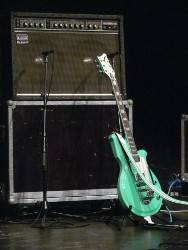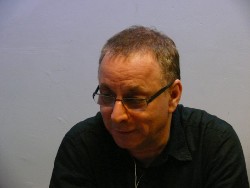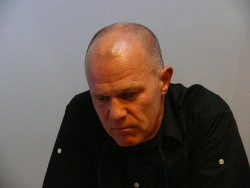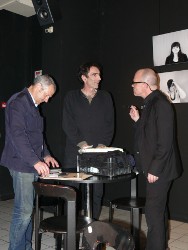
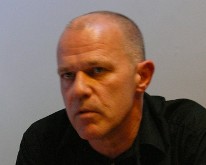
 © Copyright 2009 Rock Interviews dot com, Photos : Rock-Interviews.com.
© Copyright 2009 Rock Interviews dot com, Photos : Rock-Interviews.com.


 © Copyright 2009 Rock Interviews dot com, Photos : Rock-Interviews.com.
© Copyright 2009 Rock Interviews dot com, Photos : Rock-Interviews.com.


Wire - Interview - May 25th 2010
Epicerie Moderne - (Feyzin)



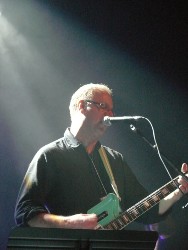
Colin : (smiling) No.
Graham : 1976 - 2010.
Colin : Activity. It's not really easy to sum it up. We started in around 1976,
although the first formal beginning of the band is sited as the 1st April 1977, when we played The Roxy.
Graham : As a 4 piece.
Colin : When we recorded for the live at The Roxy, we used to be five piece,
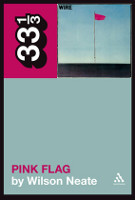 but that's a long story and nothing to do with this. And if you'd like to
know about the early years of Wire then read Wilson Neate excellent book
on Pink Flag , available from
pinkflag.com
but that's a long story and nothing to do with this. And if you'd like to
know about the early years of Wire then read Wilson Neate excellent book
on Pink Flag , available from
pinkflag.com
Graham : And published by...it's a series called 33 1/3. It's a very very
good book, with the old stuff.
Colin : And basically we have, always had a fairly interesting attitude towards
what we're doing, we are very comfortable with what we are doing, for being musicians,
for being artists, and we have always taken a view to the music that it should be
seen in the larger context, we are interested in constructing and deconstructing,
within the format of a broad format of pop and post-rock and we've been in and out
of that for many years, where we got some period of existing and not existing.
We have each individually made lots of different things, lots of different collaborations.
We've been to lots of places, play to lots of people, made lots of records and have fun some times !
Both of them : Well, It's not called "The" Wire.
Colin : The Wire is a magazine.
Graham : It's also an extremely good TV series.
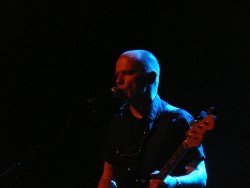 All together : We're Wire.
All together : We're Wire.
Graham : That's to start off with, that's rather an important point, because
when we thought about having and started working as a group, it was certainly
not going to be, I think I heard someone say "The Wires" and we said certainly not,
it's got to be "Wire"...I can't remember your question !
AM : My question was what are the words which can symbolize the music of Wire ?
Graham : I think change as always been an essential part of what we do. Sincerity.
I think we try to mirror, even in a very distorted way what is actually going on
in the reality, in our reality and other people's reality...Well I don't know, change...
Colin : I would first of all describe ourselves as contemporary artists.
Graham : Yeah.
Colin : And that's really overrides everything. I mean, we don't play a lot of
the games of the industry, because we don't fit in very well with it,
we've always been somewhat outsider in a way that we go about things,
it's not bloody mindedness or stupidness or something like that. We're
just some people that would like to do something interesting, we don't
mind having some things which have a good tune and we can do other things
which don't have such a good tube, are more noise based or more aggressive,
or whatever, we have a fairly open attitude towards what it is that we do
and you know what we do is always informed by other media.
Colin : Yeah.
AM : She is the bass player.
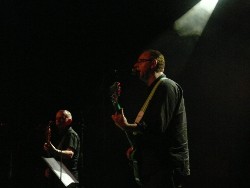
Colin : She is the bass player and also singer. She is actually the main singer, we've been married since God knows how long.
AM : 1986.
Colin : 1986, you are correct.
Graham : 2 points.
Graham and Colin : (speaking French) 2 points.
Colin : What can I say about it ? I find it very interesting to be in more than one band.
I think collaboration is a very interesting thing to do. I think both bands although
neither band would like it, inform each other very interestingly and I become informed by
the way that musicians react to certain situations and it helps me understand very
well what is good for one set of individuals, and what is not so good for a certain
individuals, so for me to really have to refine that as an idea. I also do other
collaborations with other people but those are the two main things I do. I used to think
it was a kind of schizophrenic thing but I don't feel that at all now. I feel actually
it's quite an integrated thing and there is, I've just had the most amazing interesting
learning curve from this.
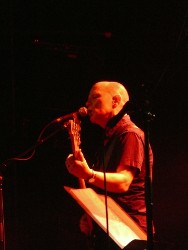
Colin : It's nice to be on the road with your missus, sure, but I don't think you
really need to explain that in terms of...for me I find that, there is a real
problem over issues with female artists, people seem to think that female artists
occupy a kind of space of female artists. You have to be female first before than
just artist, and I feel those things like keenly, because I work with Malka.
I think she is a very interesting artist in her own right, especially actually
things she doesn't do with me. It also makes me much more aware to see the
world from lots of different perspectives. These things are just incredibly
important to become a more rounded human being.
Colin : And also a label called Pink Flag.
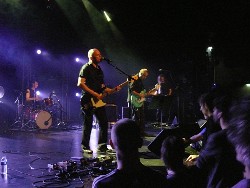 AM : Yes, Pink Flag.
AM : Yes, Pink Flag.
Colin : Yes, I'm multitask ! It's kind of, it's part of, I think it's really important
for a contemporary artist to understand how they make their money. I'm not afraid of
money and I'm not afraid of talking about money, because if one is an artist, one needs to live,
it's incredibly important, because you cannot do it as a hobby, you cannot be serious and do it
as a hobby. somebody has to be, there has to be some payment and when you're in your twenties
people are growing by experience and are very happy and they throw money at you, not that it's yours...
you end up having to pay it back, but they think...
Graham : I wonder why they always failed to tell you that !
Colin : They don't always tell you that you have to pay it back. But when you get in your thirties,
if you're still vaguely successful they are still happy to give you money, but as soon as you get
in your forties, they're starting to think perhaps they're not going to give you any more money,
and when you get in your fifties they want you to give them money ! it's like nobody wants to help you,
when you are over a certain age, you have to figure that out for yourself and the earlier,
the younger you start doing that, the better it is because, realistically what happens to artists,
because they have very very bad experiences, become incredibly greedy.
Graham : And bitter.
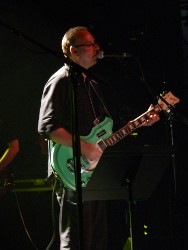
Colin : And bitter about their own situations, and this is a bad situation and it's because it's
failing to understand business, not The business, just business. You know there is an industry
attached to this, not all industry is bad, you just have to understand what's the good bit that's
useful to you and can help, you know self-production, self-distribution of music is a very very
good way in which people who make music can engage with putting out their own records, and if
they engage properly with the means of distribution they can also make most of the money back.
That is, they have nobody taking a bunch of money from them, it may not be enough to live off,
but it's just one more income stream, that could be added to their existence.
AM : Do you agree with Colin, Graham ?
Graham : Which Bit ?
AM : What Colin says about...
Graham : About...I don't understand the question.
AM : About all this business...and when you are young it's better...
Graham : That is just common sense. I mean it's not rocket science, is it ? It's really straight forward.
I think if you commit yourself to being an artist, then your responsibility is to your art,
and if you are going to do that, then somehow you are going to have to find a way of financing that...
even if it's robbing banks, I don't know, whatever is necessary to do what you want to do.
I think flexibility is an exceedingly important part of doing that, because it also allows you
to experience other media, also to be able to collaborate with other people, which obviously
helps you fund your activities, but also to grow an education is an absolutely vital part of
that, so for myself you know I've worked with,and still do, I work with installation art,
with composition for films, for contemporary dance, improvisation, with many many different
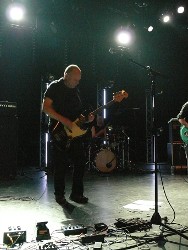 artists and also with my own work, because I think that's, you know, the most important thing
is that you allow yourself the opportunity to change your mind, and I think this is what keeps
you alive, it stops you becoming bitter, it stops you becoming cynical, because once you
become cynical you may as well pack up
because then you should join some other activity, because that's not a good way to be,
it doesn't open your heart, it's doesn't open your mind, and without that you don't see,
when you don't see, then you just joining the blind, and that's not good, if you are blind
you won't be watching this on TV. You know I think it's this thing of keeping your mind open,
and I think trying to be honest with your intentions and with the people that you deal with,
that allows you to have some kind of moral authority in your life and in your work,
and I think in that way you grow, otherwise you just become corrupt, bitter, bored,
sold and you're shit.
artists and also with my own work, because I think that's, you know, the most important thing
is that you allow yourself the opportunity to change your mind, and I think this is what keeps
you alive, it stops you becoming bitter, it stops you becoming cynical, because once you
become cynical you may as well pack up
because then you should join some other activity, because that's not a good way to be,
it doesn't open your heart, it's doesn't open your mind, and without that you don't see,
when you don't see, then you just joining the blind, and that's not good, if you are blind
you won't be watching this on TV. You know I think it's this thing of keeping your mind open,
and I think trying to be honest with your intentions and with the people that you deal with,
that allows you to have some kind of moral authority in your life and in your work,
and I think in that way you grow, otherwise you just become corrupt, bitter, bored,
sold and you're shit.
Colin : Went bust. Yes, it's the way of all things, there was a point in the 90's when a
bunch of small labels had a meeting in a bar near Soho Square, because a major distribution
went bust, and we were wondering how we were going to get our records distributed, and a
couple of us were sitting there listening to everybody whining and thinking you people are
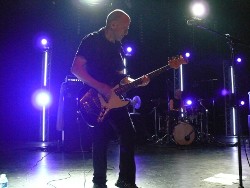 talking a load of shit...All they wanted to do, they'll take anything, they don't care,
they're not interested in the idea of independent distribution only in sorting themselves out...
And I had this idea like well supposing you could invent rough trade for the future age...
How would you do that ? Well you would need a kind of store room on the Internet...
Well, do we know anyone who could do that, and we've found someone who could do that,
and we made a store and the whole idea was that simply...That we foresaw a problem before
anybody else saw it and that was...This internet thing was going on and every kind of music
was going to become available for everybody and how did anybody going to know what was any
good, because there is nothing to guide them, I mean you would go to Amazon in say 1997-98
and order a record by, I don't know, Bjork and they would give you a list of recommandations
based on what you bought, which was so far from anything that you might like,
because they have not refined those things at that stage. How does anybody know what
you are going to get, so we thought, okay we could get all the really good kind of music
and put it in one place, then people would really like that, and they would buy that,
and it was a fantastic idea, it's just it didn't work ! (both laughing)
I have been told recently that we were way ahead of our time and this is excactly what is needed now.
talking a load of shit...All they wanted to do, they'll take anything, they don't care,
they're not interested in the idea of independent distribution only in sorting themselves out...
And I had this idea like well supposing you could invent rough trade for the future age...
How would you do that ? Well you would need a kind of store room on the Internet...
Well, do we know anyone who could do that, and we've found someone who could do that,
and we made a store and the whole idea was that simply...That we foresaw a problem before
anybody else saw it and that was...This internet thing was going on and every kind of music
was going to become available for everybody and how did anybody going to know what was any
good, because there is nothing to guide them, I mean you would go to Amazon in say 1997-98
and order a record by, I don't know, Bjork and they would give you a list of recommandations
based on what you bought, which was so far from anything that you might like,
because they have not refined those things at that stage. How does anybody know what
you are going to get, so we thought, okay we could get all the really good kind of music
and put it in one place, then people would really like that, and they would buy that,
and it was a fantastic idea, it's just it didn't work ! (both laughing)
I have been told recently that we were way ahead of our time and this is excactly what is needed now.
Colin : God that sounds familiar.
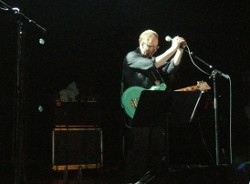 Colin : Yeah it does. So for a generation that are now in
their early 20's, they come to me saying "posteverything" you guys were so cool,
I think yeah we've lost a fucking ton of money,how cool is that ?
Colin : Yeah it does. So for a generation that are now in
their early 20's, they come to me saying "posteverything" you guys were so cool,
I think yeah we've lost a fucking ton of money,how cool is that ?
Graham : I was going to say, the similarities to Wire's early days of rather similar
action where we made the first 3 records and at that time the reviews tended to go on
the lines, there are at least 2 or 3 years ahead of their time but unfortunatly the
audience wasn't. All the musicians were, David Bowie and all these people, they all
said, God this is a fucking good idea, you know, we want some of this, and we ended
up with a very peculiar situation of being non musicians who created music where we
had the situation where we became the musicians band which is quite ironic, I thought
and surprised the hell out of us really, because you know you don't really expect that,
so as Colin said you know, it goes again, you have to do what you know is right.
If it fails, then you learn something about why it didn't work or why is the time not right,
it doesn't mean it was the wrong thing to do, because sometime you even know it's going
to be the wrong thing to do, but if you are correct, then you sometime, you just have to
fucking do it and just bite the bullet and go ahead and fail and fail gracefully
I think, isn't it ?
Colin : I'm still in the hole.
Graham : Yes, I know, but that's what you've got to do, we've got no choice.
Colin : But I must say actually from it, not going to go into persons,
but one person has come up really smiling and very lovely and will always be my
friend because of that, and one person hasn't, because they haven't put their share
to wipe out the debt. It's been kind of instructive, but I know that they haven't
got any money either, I know it's kind of brutal but I do think it was a good idea
but perhaps it was too arty an idea for the medium, because what people probably
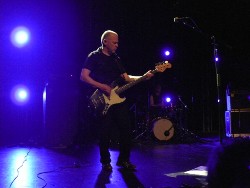 really want is, they just want a general shop they can buy any old rubbish,
but I'm not really interested in that.
really want is, they just want a general shop they can buy any old rubbish,
but I'm not really interested in that.
Graham : I was going to say the thing about it is you know, who is to know how fast
things develop and what you came up with was in a way like a boutique idea,
where you went and you could be special in the same way, well I can remember
the days when you couldn't buy clothes which were any good and what you had to
do is wait for someone to open a boutique that could make something you wanted,
you went to them and eventually what happened was that the people who were commercial
said that's a good idea and they develop it into something else and the people in the
boutique go bust.That's just life, that's the way art works, it's the way commerce works.
Colin : Actually I mean pinkflag did fantastically well out of "posteverything".
Graham : There you go.
Colin : Posteverything didn't, you know, especially with sales we did amazingly well with them.
Graham : It's always (speaking French) comme ci, comme ça.
Colin : Now we're working with the company that's doing all our digital with was
"posteverything" main rival. but yeah, that's life !
AM : Yeah... Thank you very much Colin and Graham for you time.
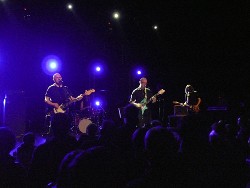 Graham : I've got something to say about that...Go on...
Graham : I've got something to say about that...Go on...
Colin : They could read 3, actually.
AM : The first one is by Wilson Neate.
Graham : Neate, yeah, this is the book.
AM : It's entitled Pink Flag 33 1/3.
Colin : Yeah.
Graham : That's the series, it's a series of books on Continuum's, isn't it ?
AM : Yes it is.
Graham : it's published by a Company called Continuum who are really an
academic publisher, I don't want you to be put off by that,
but they do an extraordinary series which is called 33 1/3 which
is very uneven, but their books which are dedicated to one record,
so you have one on the first Velvet's album, one of the first Ramones album,
The Smiths, you know, and then each book is written by a different
person and written from a different perspective, some are good,
some are not so good. Wilson, his original idea, what he wanted
to write about was 154, because that's his favourite record from
that period, but being the smart guy that he is, he understood that
Pink Flag has a particular iconic status in America, because it meant
an awful lot to the hardcore movement, straight edge and all of that,
it's very inspirational, so when he approached the publisher, he said
would you like to do Pink Flag, they said yes that's a very good idea,
so from that Wilson he understood and then that gave him the possiblity
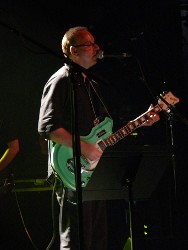 of asking us about how we came to do, what we did, who we were, how we
came to be, where we were, etc...and I thoroughly recommend it if
anybody is interested in, even vaguely, because I think it does something
which has rarely been achieved in the sense that he really does, through
our reminiscences or our reports as eye witnesses actually talk about
that period from an honest point of view, in real context, because so
much has been blurred and distorted by the likes of Malcom McLaren,
Punk, you know all of this stuff, which a lot of it is totally untrue
and miss making and I think the book, it's a terrific book. As for the
other books Kevin Eden's book which was written a long time ago,
we have never been happy with the architecture of the book because
it's basically him interviewing us quite often in the pub which is
probably not such a good idea and then basically editing out the questions,
so what you end up with is like this stream of consciousness of
4 people who appear to have taken God knows what kind of mind altering
substance which goes...and it's very unsatisfactory. However it does
have some interesting aspects in terms of discography, gigs and stuff
like that, which although all together not correct is the best thing
which is available for a long time. The last book by Paul Lester is
a book which is written by someone who is a journalistic hack,
who was making money in order to pay for his divorce I think and you
end up with a very disatisfactory book, because he didn't listen to
what we had to say, it's very repetitious, it is badly edited, it's
not sub edited and I would not recommend anybody to buy it,
it's called Lowdown it should have been called letdown.
of asking us about how we came to do, what we did, who we were, how we
came to be, where we were, etc...and I thoroughly recommend it if
anybody is interested in, even vaguely, because I think it does something
which has rarely been achieved in the sense that he really does, through
our reminiscences or our reports as eye witnesses actually talk about
that period from an honest point of view, in real context, because so
much has been blurred and distorted by the likes of Malcom McLaren,
Punk, you know all of this stuff, which a lot of it is totally untrue
and miss making and I think the book, it's a terrific book. As for the
other books Kevin Eden's book which was written a long time ago,
we have never been happy with the architecture of the book because
it's basically him interviewing us quite often in the pub which is
probably not such a good idea and then basically editing out the questions,
so what you end up with is like this stream of consciousness of
4 people who appear to have taken God knows what kind of mind altering
substance which goes...and it's very unsatisfactory. However it does
have some interesting aspects in terms of discography, gigs and stuff
like that, which although all together not correct is the best thing
which is available for a long time. The last book by Paul Lester is
a book which is written by someone who is a journalistic hack,
who was making money in order to pay for his divorce I think and you
end up with a very disatisfactory book, because he didn't listen to
what we had to say, it's very repetitious, it is badly edited, it's
not sub edited and I would not recommend anybody to buy it,
it's called Lowdown it should have been called letdown.
Colin : That's the Sun version.
Graham : That's the Sun version, I know he uses Sun writers so he
gets the Sun review, you know what I mean ?
AM : Yeah.
Graham : He gets a cheap review for writing a cheap book.
Colin : Yeah.
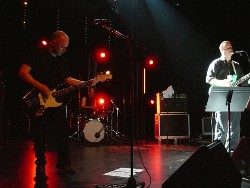
Graham : And exploiting our good will, I rest my case.
Colin : Yeah, I don't really want to add anything to that.
Graham : I read the first 4 pages, I just thought this is ridiculous,
Colin : The man is an idiot.
Graham : He is an idiot.
Colin : The way they actually got him to do the book, was he submitted it
chapter by chapter, so the chapter he already submitted and he is writing
the next one, he is writing half the things that already written in the
previous chapter, it's not only slightly repetitious it's hugely repetitious.
Graham : Don't go on about it, it is just a waste the space to talk about.
Colin : Stupid articles, you know so it's really a bad book.
Graham : It's a bad book, it's a disgrace.
Colin : Next question !...
Graham : His wife run off with the plumber.
Colin : Yeah.
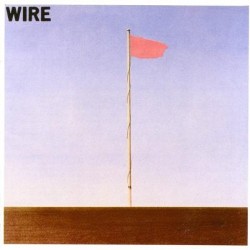 Colin : Yeah.
Colin : Yeah.
AM : Pink Flag was the first one.
Graham : In 77.
AM : Yes. One of your best fan in France wants to ask you this question.
Colin : Okay.
AM : Who is the Surgeon's Girl ?
Colin : Who is the Surgeon's Girl ? Nobody ever asked me that before.
Probably my first wife, maybe, who knows ?
AM : Yes, who knows ?
Colin : I had a surgeon smock when I first started.

Graham : Bruce had this ingenious idea of Colin wearing, you know the garment
surgeons wear and no shoes. It was sort of like a white muslim and it looked
more like he had just escaped from an institution.
Colin : Yeah.
Graham : But it was like a surgeon, but it was like a mental case and you
couldn't quite tell, so she was the Surgeon's Girl.
Colin : She could have been the surgeon's Girl, she was my wife at the time,
maybe she was.
Graham : Like so many Wire things, it starts off by being this thing and
then it tends to travel to other places.
Colin : I write some, I have a very different writing style to Graham.
I don't really care so much about sense, it's not really too important to me.
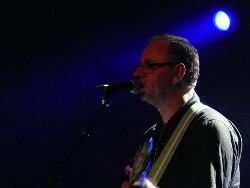 Graham : Colin is experimenting about a life without narrative. (laughing)
Graham : Colin is experimenting about a life without narrative. (laughing)
Colin : Sense and meaning are two different things, and I am not obsessed
about narrative. I am quite good in doing it but I am not obsessed by it.
I think one of the problems with interpretations of Art is that the people
are so obsessed with narrative, they are always looking for narrative
built around something as if that makes sense out of something,
very often build narrative around something that doesn't make any sense,
it doesn't make anything better, it doesn't make anything more understandable actually,
it's usually bollocks.
Graham : The problem is that you got to define narrative, how do you do that ?
That is the question.
Colin : You're going to a deep, you have a deep discussion on that.
Graham : That is exactly what it is, the discussion about narrative, is what it is,
because without that, then you don't exist, which is what happens when people have a
mental breakdown, you actually lose your narrative, which is your history itself, which is
the thing we are now engaged in, which is the only way you could make sense with people who
lose that sense of personal narrative, then you are lost, which might be amusing for a time,
but it does leave you very very outside.
Colin : I think there's more ways of looking at it.
Graham : That's what I'm saying, cause you said what you said and I'm saying what I say,
that's what makes the difference about narrative. So that is what the discussion
is because that is the narrative. So you're trying to make sense of what is it.
Colin : Yeah, anyway.
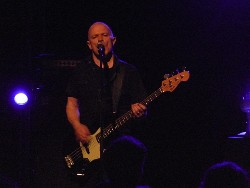 Colin : Yes.
Colin : Yes.
Graham : Oui.
Colin : Thank you. We have seen it before !
Graham : (showing the album to the camera) Object 47. I could thoroughly
recommend this, sincerely.
AM : What are your favourite tracks ?
Colin : I would say, my favourite tracks are : One of Us, Circumspect,
Hard Currency and Patient Flees. I think Four Long Years is quite good,
I think Mekon Headman is really really good job, I think we're doing
a better job with Graham's songs for the new album, he's got is a crack on it.
Graham : I think he mentioned all the tracks really ! (laughing).
Actually what I'd like to say, although we really do think it is good,
I will recommend Read and Burn 3, cause I think that's got really good tracks on it.
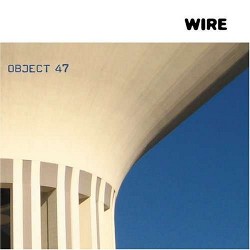
Colin : I would also like to recommend the complete version of Send, which
is Send re-released with an extra disc with a load of other stuff including all the things
which didn't come on the original album because it's completely out of Chron now.
Graham : I think you're starting to understand our narrative which is,
we don't put shit on our records.
Colin : That sort of narrative, that's just a way, a basic philosophy.
Graham : Graham : What is it...A picture is worth a thousand words.
Colin : It could be. And of course the as yet untitled 2011 album which
obviously will be the best record that ever been made.
Graham : Even by us.
Colin : It will include everything, in the entire history of everything,
it will be the best thing, really.
Graham : Unless something else turns up (laughing).
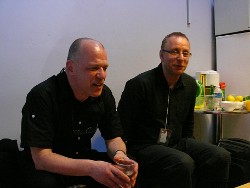 Graham : Yeah, The first time ever. La première...
Graham : Yeah, The first time ever. La première...
AM : La première fois.
Graham : Oui.
AM : So the last few days you were in Lille, Rouen, Brest, Paris.
Did you enjoy these gigs and have fun in these different cities ?
Colin : There are very very different places and we are in a situation
whereby we have come from, basically we're working on a new album,
we knew that we had an important show at Primavera Sound Festival in Barcelona,
just this week-end. We wanted to find a way to get between us doing
recording and us thinking about what we want to do next, to being on
stage with a new set at Primavera so we thought that the first thing
we need to do was to find a new guitarist alive, which we did,
we had auditions, we have found someone who we thought was really good.
Graham : Matt Simms.
Colin : Then we had rehearsals, we are playing some of the new things
from the album, we are playing a lot of new things in the set that we have,
some of the things we haven't played for a long time, it's a new set,
a very very new set, a new one, we felt that what would be very good would be to go...
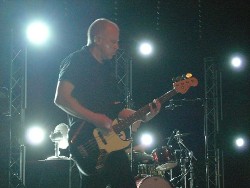 Graham : Well the thing about it is when you look at the map, see where
Barcelona is, see where London is, there is this big place in between,
we thought it will be a good idea if we sort came through here, we have
never done that, never played here on a tour and it's seven months since
we've actually played, so obviously we needed to practise, so as always
we are practising and I think, you know, that's what we are doing, this is as you find us.
Graham : Well the thing about it is when you look at the map, see where
Barcelona is, see where London is, there is this big place in between,
we thought it will be a good idea if we sort came through here, we have
never done that, never played here on a tour and it's seven months since
we've actually played, so obviously we needed to practise, so as always
we are practising and I think, you know, that's what we are doing, this is as you find us.
Colin : Absolutely but what is very interesting is I mean France is of
course has his own peculiar place.
Graham : Particular place.
Colin : One thing which was very useful for us of course we start in
Lyon because it's on the Eurostar.
Graham : Genius.
Colin : And Lille has it's own whatever, then we went to Rouen which was
a pretty interesting, it has a slightly more hardcore kind of audience,
I mean that was a good audience for us there.
Graham : It was really wonderful,they know what we were doing for 30 years.
Apse
just started... and that was great, Rouen was a really good experience
because people were extremely professional, and knew how to put a show together
and the audience was really receptive, we like the place where the audience is
educated and listen and they were willing to give us a chance to hear and
listen to, I think with an open mind to what was new, what obviously they
appreciated what was old. We had fantastic reaction for the new materials.
Colin : I don't think so many people play in Brest, so where we stayed in a hotel,
the venue was downstairs from the hotel, it was a nice holiday hotel,
hotel with a nice restaurant.
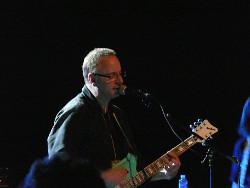 Graham : The same thing again, a really educated audience.
Graham : The same thing again, a really educated audience.
Colin : It was very different and not our usual kind of audience, much older
audience that we normally have.
Graham : In that way it was interesting, because you have the venue,
it has been going for 60 or 80 years, way back that to the jazz days so there's
a great sense of tradition and also I think therefore we had, the audience
was kind of older with the people who knew us from what we've done and seen
us in the past, and then you had a lot of younger curious audience that
really didn't know what to expect that's always a challenge. I think they
seemed to very much enjoyed it, we just heard from the press, the show
has been exceptionaly good, so that's nice, last night we "bombed" Paris.
Colin : We play Paris very regularly, we have a very young and enthusiastic audience.
Graham : It was extraordinary.
Colin : It was great.
Graham : It was a really great show. The audience were in the 20's and it was sold out.
Colin : Believe me, they were just going ape shit, there was huge mosh pit.
Graham : It rocked.
Colin : You know when we turn the tap on we can dish it out - who knows what
it is going to be like tonight.
Graham : We haven't been here before.
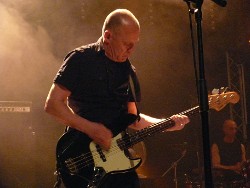 AM : Tonight you are near Lyon. (Feyzin)
AM : Tonight you are near Lyon. (Feyzin)
Colin : In Lyon for the third time actually.
Graham : We've never been here...Well
Colin : We've never been in Feyzin before.
Graham : The reason we never played here in our own right, we have always been
part of a festival, when you play a Festival you can have a rather...it's
difficult to have a very accurate perception, what actually happened or how
things have gone for you, this is it, it's a fact finding issue on stage.
Colin : I don't know if we have a future in France, I would like to think we
would grow an audience in France, France is a country where we can grow an audience...
Graham : Or grow flowers.
Colin : Grow flowers, well it is actually quite famous for growing an audience
by going round, although even though we're all like 97, we still have an ambition
to play to a big audience, and to grow as a band, and as artists and individuals,
like flowers.
Graham : That's genius.
Colin : I know, I am just admiring your little heart button.
AM : Oh yes my heart button...
Graham : I wear my heart on a string.
 Graham : On drums we have Mr Robert Gotobed, Robert Grey he is actually called,
he is reverting to his family name, he got funny name because his parents
got divorced, Robert Grey when he is not with Wire works as an organic farmer
which he has done for 20-30 odd years. He is a founder member of the group.
Then we have a new boy Matt Simms who is 24 and had, has a group called
It Hugs Back which record for 4AD records, who is the other one ?
I am not sure who the other one is...Oh there isn't another one !
Graham : On drums we have Mr Robert Gotobed, Robert Grey he is actually called,
he is reverting to his family name, he got funny name because his parents
got divorced, Robert Grey when he is not with Wire works as an organic farmer
which he has done for 20-30 odd years. He is a founder member of the group.
Then we have a new boy Matt Simms who is 24 and had, has a group called
It Hugs Back which record for 4AD records, who is the other one ?
I am not sure who the other one is...Oh there isn't another one !
AM : I'm sure you'll have a great gig tonight at the Epicerie Moderne,
thank you very much for your time with us.
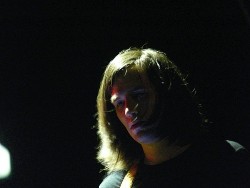
Graham : Pleasure.
Colin : Thank you for coming.
AM : Thank you very much Colin and Graham.
Colin & graham : Good bye - Au revoir.
